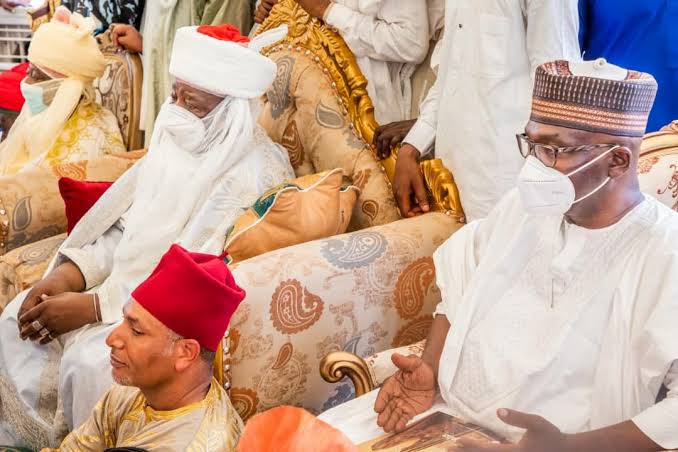By AbdulRaheem Sa’ad Dembo
InsiderNg
For some reasons, I have been very reserved on the issue of the much talked about pavilion project being constructed at the forecourt of the Emir of Ilorin, Dr. Ibrahim Sulu-Gambari, CFR. My reasons are not far-fetched. I have decided to take a cue from the uncommon maturity shown so far by Senator Saliu Mustapha on the vexed issue. MSM, as fondly called, has handled this matter with a rare blend of grace, maturity, and candour, traits that, if the tables were turned, his critics and traducers would likely struggle to maintain.
The Sulu-Gambari Pavilion, ambitious in vision, symbolic in intent, and unifying in purpose, has become an accidental theatre of bureaucratic posturing and unnecessary political distraction. What should have been a straightforward public legacy project is now mired in the kind of administrative gridlock that exposes the fragility of our governance culture.
It is important to state from the outset that oversight in officialdom is inevitable sometimes. It is equally important to state that no one should build above the law, and every institution, whether federal or state, must operate within the checks and balances that define a democracy. But there is a fundamental difference between scrutiny and sabotage, between institutional due diligence and institutional bad faith. What we are witnessing in the case of the Sulu-Gambari Pavilion increasingly feels like the latter.
The pavilion, facilitated by Senator Saliu Mustapha, is more than bricks and columns. It is a tribute to a revered traditional institution. It is a gift to the people. The Senator, by delivering this project, declares his understanding of legacy in public service. He is writing his chapter, not with noise, but with substance. Yet, even this is not enough to escape the long arm of due process.
But one thing that shouldn’t escape us is, how many projects across Kwara’s Northern and Southern senatorial districts have been subjected to such intense bureaucratic nit-picking? Right as we write, many roads are being constructed, buildings are being erected, and other multi-million naira interventions are underway, all with little public fanfare about process. If there is a new standard of rigor, we welcome it. But let it be consistent. A law applied selectively is worse than no law at all. It erodes trust, breeds resentment, and hollows out the very concept of justice.
“When laws are enforced selectively,” someone once said, “justice becomes a tool of oppression rather than a shield of protection.” This is not just poetic warning, it is democratic reality.
Amid this storm, Senator Mustapha has conducted himself with remarkable restraint and statesmanship. He has not launched salvos on social media. He has not accused, ridiculed, or undermined. Instead, he has advised the project contractors to comply with government terms, going so far as to acknowledge the regulatory authority of a state government not entirely friendly to his politics. In doing so, he has demonstrated a grace rare in our political ecosystem, the discipline to put institution above impulse.
Sadly, the same cannot be said of those around the state’s power centre. Instead of seeking resolution, some of the governor’s media handlers have weaponised narrative. Their responses to Senator Mustapha’s goodwill have been nothing short of inflammatory. They have chosen escalation over empathy, suspicion over cooperation.
But here is the quiet truth they seem to forget, legacy is not built by loudness. The facilitator of the project has etched his name in stone. Good or bad, history is already being written. So too are those whose actions now threaten to derail this noble initiative. The public is watching, and judging, with more clarity than many realise. The online and offline murmurs are not just chatter, they are verdicts in the making.
To be clear, this is not about one man’s glory. This project, if allowed to be completed, will bear the legacy not just of Senator Mustapha, but of our noble Emir whose reign it honours, and of our amiable Governor in whose time the idea materialised. If the project succeeds, all three emerge taller. If it fails, the blame will not be shared equally.
There is, however, reason for hope. Many of those who have spoken up in support of the pavilion are, in fact, friends of the state government. People like Abdulateef Babafila of Kwara Must Change, have shown that maturity can exist alongside loyalty. They see the bigger picture unlike the minors commissioned to be writing junks against respected public figures old enough to be their fathers. They understand that progress does not wear party colours.
All other people of good conscience must now also lend their voices, not in anger, but in pleas, especially to the architect of modern Kwara, the Executive Governor of Kwara State and the leader of the party in the state, Gov. Abdulrahman Abdulrazaq, CON.
Let the project breathe. Let development win. Let maturity prevail. Because in the end, this is more than a pavilion. It is a mirror. And everyone standing before it—Senator, Emir, Governor, and the citizens, is writing their legacy in the reflection.
AbdurRaheem Sa’ad Dembo, Public Affairs Analyst writes from Ilorin.


